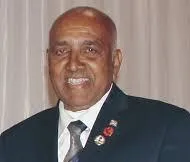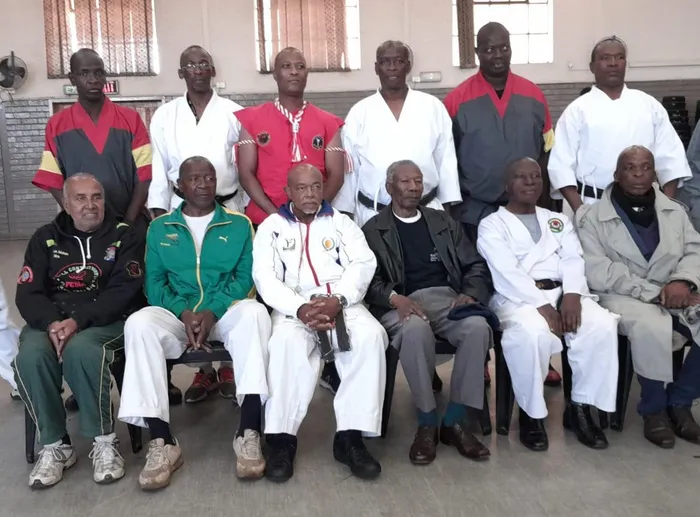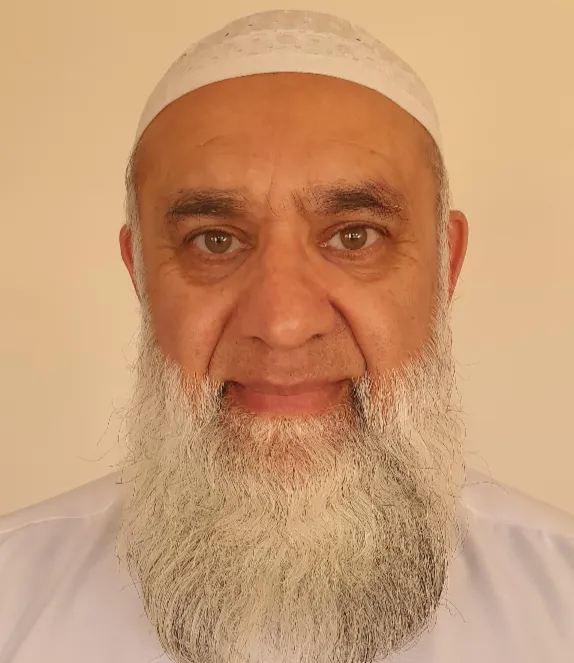
Hanshi Mohan Hira
Image: Supplied
LENASIA karate master Hanshi Mohan Hira’s journey to becoming an internationally recognised karate expert began in the mid-1950s, where he faced significant barriers to his sporting career due to apartheid. Despite being denied entry to white-only dojos as a youth, his determination led him to train privately with Norman Robinson, eventually inspiring others in the community to pursue martial arts.
Born in India on December 14, 1938, Hira immigrated to South Africa in 1947, settling with his family in the Malay Camp in Ferreirastown in Johannesburg. He began his martial arts training in 1956 and earned his First Dan in Shotokan Karate in 1960.
Over the years, he has trained under internationally renowned karate Masters and graduated hundreds of junior karatekas. Hira also participated in bodybuilding, table tennis, soccer and cricket, and completed notable endurance events such as the Johannesburg to Durban “Footsteps of Gandhi” Walk.
In 2001, he completed in nine days the arduous 485km Salt Walk in India, tracing Gandhi’s historic 1930 march against British colonialism.
In an interview on his life with veteran photojournalist, Fakir Hassen, about his forthcoming book, Mohan Hira - Humanitarian Extraordinaire, he explained: “We lived in Market Street in Central Johannesburg. Jack Robinson’s dojo was at the corner of Main and Eloff Streets, near to where we lived, so I would go there as a teenager to look at how the whites were learning karate. Of course, even if we wanted to, we could not join the dojo because of the strict separatist laws of the time. Shihan Jack had introduced judo to South Africa, but it was still an exclusively white terrain.
"We were chased away repeatedly from the dojo, and there were even threats for the police to be called in to arrest us. One day, Jack’s son, Norman, approached us and wanted to know why we were not deterred by his father’s threats. We said we wanted to learn karate. By that time, I had already learnt judo at the Bantu Men’s Social Centre, and I told him that I was keen to supplement this with training in karate.”
" 'If you really want to learn karate, come back here at 9 o’clock at night once a week on Mondays after the classes are finished', Norman had said.
“So, I went with my friend, Peter Motsilele, who was a boxer and body builder. We went there every Monday. That is how I learnt the art of karate.”

Hanshi Mohan Hira (seated front left) with his senior black belt graduates since 1956
Image: Supplied
After completing his education at the Transvaal Indian Congress-aligned Central Indian High School in Fordsburg, Hira founded the Gama Judo, Bodybuilding and Karate Club in Johannesburg. He played a pivotal role in developing local black talent, including supporting bodybuilder, Sipho Mashinini, who achieved national and international success.
From time to time, Hira’s club was disrupted by apartheid policies, but he continued to teach and mentor students in various locations in central Johannesburg and Fordsburg, eventually establishing a gym at his home in Lenasia.
From the beginning, Hira’s club was explicitly non-racial, drawing members from all racial groups. Among them was bodybuilder, Sipho Mashinini, which the club sent overseas in 1968 as Mr South Africa, where he came sixth in the world championship. Mashinini held the Mr SA title for six years after that as part of the Transvaal Bodybuilding Association that was affiliated to the non-racial South African Council on Sport.
The Hira family were staunch supporters of the Transvaal Indian Congress and passive resistance and refused to move to Lenasia because of the Group Areas Act. However, due to intense repression under apartheid, the family was forced to relocate in 1970 to Lenasia.

Lenasia turns 70
Image: Supplied
They first settled in Flamingo Street, Extension 3, Lenasia and as the demand for karate training increased in the area, Hira established his dojo at the council-controlled Jasmine Hall in the emerging Lenasia CBD. Since then, it moved to the Recreation Centre in Extension 3, the Highpoint Business Block, the Gandhi Hall and the Ramakrishna Centre. Finally, Hira opened a gym at his home in Hydrangea Avenue, where it operates to this day.
“With support from my family, and especially my late wife, Shantiben, I have never looked back. We got the opportunity through karate to travel the world and gain love and affection from thousands of children and their parents. I continue to gain satisfaction from watching my students progress as karatekas,” said Sensei Hira.
Hira’s commitment extends beyond sports. He is deeply involved in community initiatives, including the restoration of the historic Tolstoy Farm, which served as the nerve centre of Gandhi’s passive resistance movement between 1911 and 1914. Hira was a founder member of the Gandhi Walk Committee in 1986, and its inaugural chairperson. His lifelong dedication to Gandhian principles and humanitarian work has made a lasting impact in Lenasia.
“While I attended Congress protest events with my grandfather as a child, and raptly listened to the stories told by him and other elders in the community for many years more, I could hardly have imagined that one day, I would be tasked with taking on the restoration of Gandhiji’s one-time home in Johannesburg, Tolstoy Farm,” he said.
“Gandhiji had lived there, and I could live to see the place being run down. I commute thrice weekly between my residence in Lenasia to Tolstoy Farm to see to its maintenance as we try to develop it as a tourist attraction. So, my life has been about passing on karate skills to children and adults and a passion to see Tolstoy Farm return to its one-time glory,” explained Hira.
In addition to his sporting achievements, Hira has appeared in several film and stage productions. He played varying roles in the following productions: King of Africa, Red Elephant, Ducktails, People are Living Then, and Advocate.
In Advocate, he starred opposite the legendary Ken Gampu and Simon Tsabela.
Hanshi Mohan Hira has received numerous global and community awards, including induction into the Martial Arts Hall of Fame (2003), Human Rights Awards (2003 and 2005) and the SBSM “People Who Care” Award (2004). He continues to teach and inspire, dedicating his life to the advancement of karate and the betterment of the Lenasia community based on the principles of peace and reconciliation.

Dr Ismail Vadi
Image: File
Dr Ismail Vadi is a former ANC MP and MEC for Roads and Transport in Gauteng. He is the convenor of the Lenz70 Campaign.